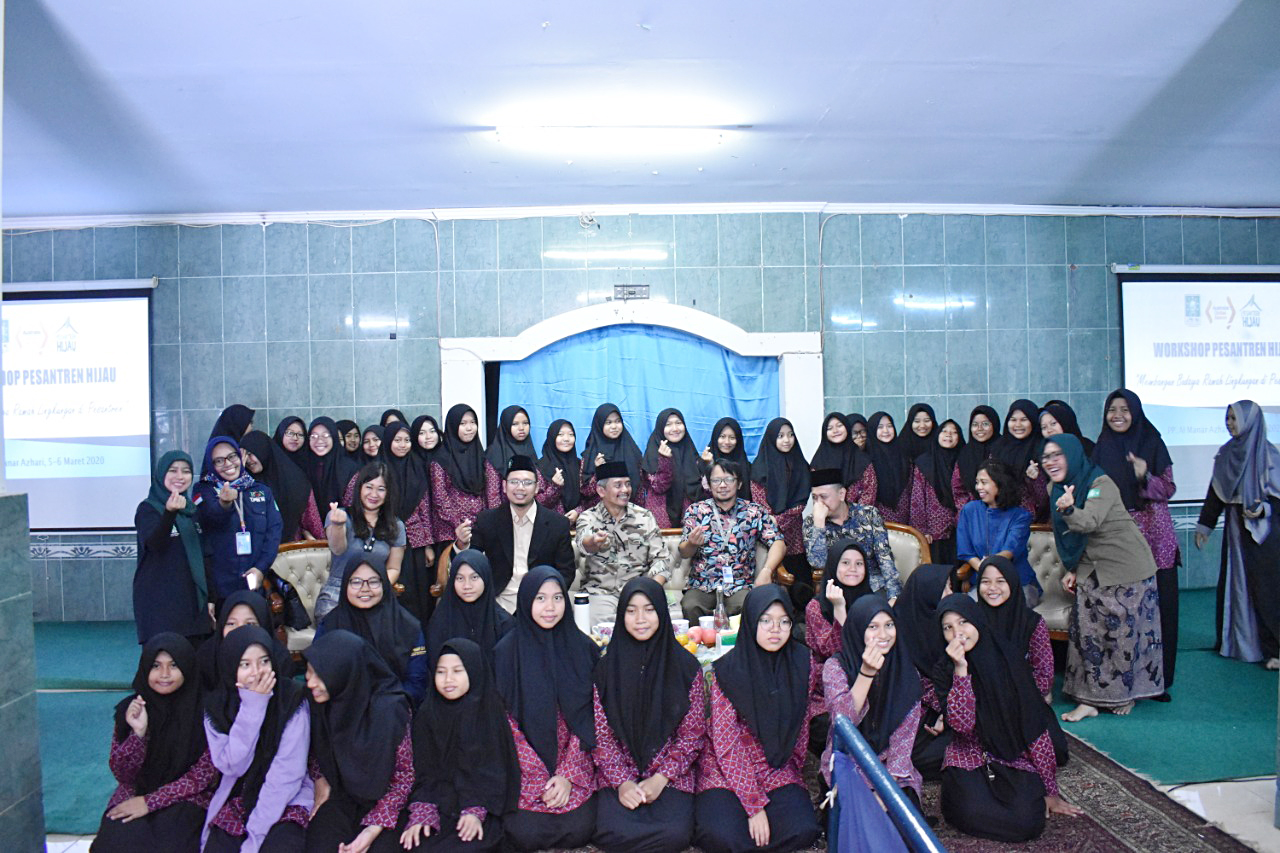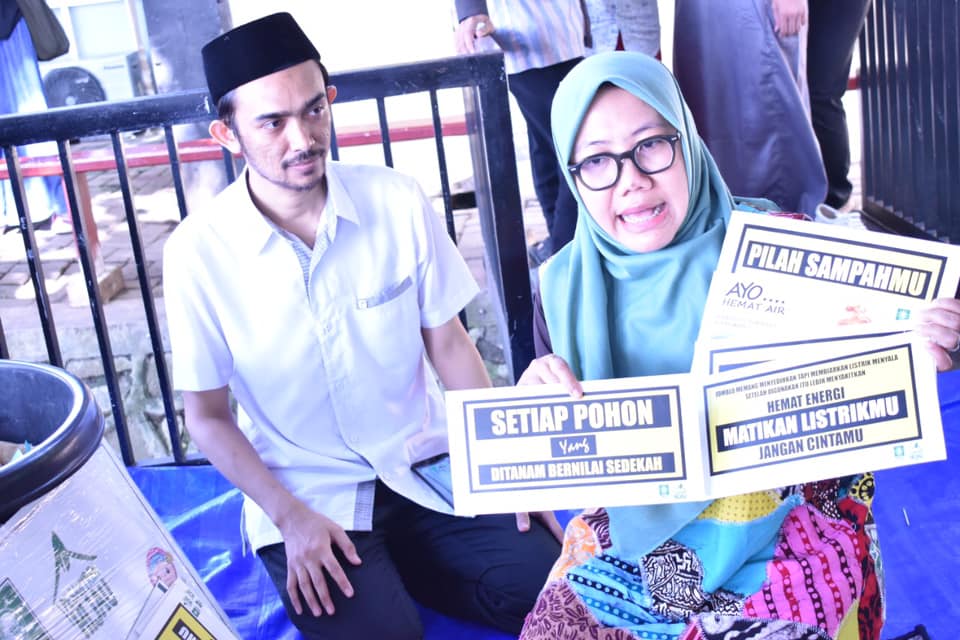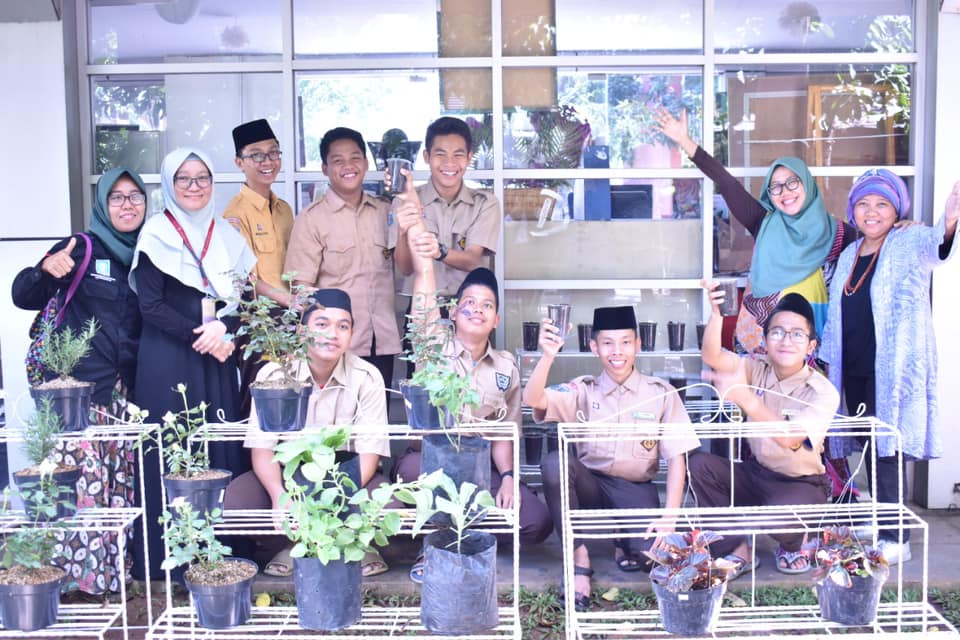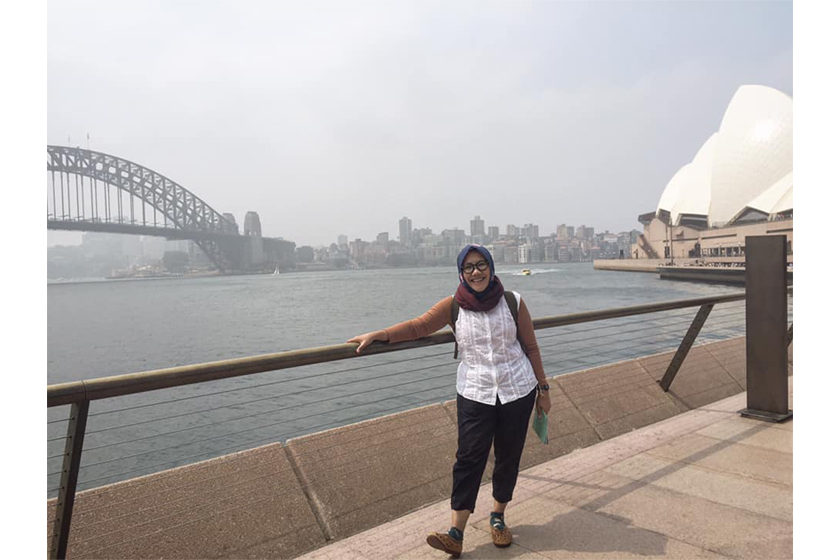Hijroatul Maghfiroh, the founder of Pesantren Hijau, or Green Islamic Boarding School program, measures its success not by big and drastic changes, but in baby steps.
For example, one of the Islamic boarding schools (pesantren) that received Pesantren Hijau’s training has been able to reduce plastic waste so much that a group of scavengers wanted to know why they were getting less plastic waste from the school.
Another Pesantren Hijau boarding school partner in Tangerang, near Jakarta, told her that the school’s students had to go hunting outside the school for plastic wrap and bottles to be made into ecobricks as part of the program.
“I was proud and touched when I heard the stories. These small changes mean a lot to me," said the 37-year old alumna of the 2018 Muslim Exchange Program, supported by the Australian Government.
Maghfiroh started Pesantren Hijau when she became Program Manager of Climate Change at Nahdlatul Ulama Disaster Management and Climate Change Institution (LPBI NU) in 2015.
Working with Islamic boarding schools within Nahdlatul Ulama (NU), Indonesia’s largest Muslim organisation, the project aims to introduce environmental-friendly management and raise awareness of environmental issues, such as waste and water management.
According to a 2015 study published in the journal Science, Indonesia is among five countries that are responsible for more than 50% of total plastic waste in the oceans. The other countries are China, Vietnam, the Philippines and Thailand. Indonesia is the second-largest marine polluter after China, despite initiatives by city and regional administrations to ban single-use plastics.
Spending most of her education in NU affiliated Islamic schools, including a stint studying at a pesantren during her high school years, Maghfiroh was familiar with the environmental challenges. Each pesantren can house between 100 and 5,000 students, and they struggle with the sheer volume of household waste, clean water, and green open areas.
“A pesantren is like a miniature Indonesia. They face sanitation problems such as waste production and water management. These are also the problems in communities," said Maghfiroh, who majored in Islamic Law for her undergraduate degree at Syekh Nurjati State Institute of Islamic Studies (IAIN) in Cirebon, West Java.
“It is easier to approach stakeholders in a pesantren than it is to change state policy. For example, we can ask the school’s canteen to reduce plastic wrap and ask students to bring their own tumbler,” she added.
Moreover, as the biggest and oldest educational institutions in Indonesia, pesantren are a powerful force to drive environmental-friendly practices in communities. Nahdlatul Ulama, for example, has some 20,000 pesantren under its wing.
“Pesantren stakeholders – Ustaz (teachers) and students – are influential people in communities,” said Maghfiroh. “The students can pass on their experience to their parents and peers. If a pesantren has awareness, environmental-friendly practices can materialise in 10-20 years."
In the first few years of the program, Maghfiroh and her team tried to draw up a simple guideline for green Islamic boarding schools by approaching several interested pesantren. She also came up with a one-day training program for several boarding schools.
A breakthrough came in 2019 when Pesantren Hijau received funding from the Alumni Grant Scheme (AGS). With AGS support, Maghfiroh was able to hold an expert meeting to develop modules for the program. In the May 2019 meeting, Maghfiroh invited three Islamic boarding schools who shared similar ideas on green pesantren, and experts from various institutions, including the Religious Ministry, Environment and Forestry Ministry, and Greenpeace.
The meeting produced five indicators for green Islamic boarding schools: environmentally-friendly media campaigns; waste management based on waste banks, or Bank Sampah Pesantren (BSP), composting and the “3Rs” (Reduce, Reuse, Recycle); waste management through production of ecobricks, wastewater management and green open space.
An Islamic boarding school that wants to join the Pesantren Hijau network must have at least one of the five indicators.
“We are aware that it would be difficult for pesantren to apply all five indicators,” she said.
“I am thrilled because we finally have guidelines. We uploaded the guidelines to the NU Online website because we want all pesantren under NU to access it. This is, I think, our main achievement,” said Maghfiroh, who graduated from Leiden University in 2010 with a Master in Islamic Studies.
AGS support has also allowed Maghfiroh to expand Pesantren Hijau training into a two-day program, consisting of one day in class and one day hands-on. On the first day, students learn about climate change and environmental issues. On the second day, students learn about waste management, such as identifying waste produced in their school.
"They learn how to calculate the waste volume produced by their school and what type of waste they think is most difficult to manage. This aims to bring students closer to waste problems in their neighbourhood,” she explained.
Students can also learn about growing their organic pesticide-free and chemical-free vegetables, composting and biopore water management, and making ecobricks to reduce plastic waste.
Ecobricks are a plastic bottle stuffed with clean, dry used plastics, such as snack wrappers until the bottles are packed to certain solidity. These plastic bottle bricks can be used for building construction. As for biopore water management, students learn how to make biopore infiltration holes which is a cylindrical hole planted in the ground vertically. The biopore holes can retain rainwater into the ground. The holes can also be filled with organic waste for composting.
Pesantren Hijau also introduced Garda Pesantren Hijau, or the Green Islamic Boarding School Guard, as an extracurricular activity for schools in the network.
At present, there are nine schools in Pesantren Hijau network and it has also extended to pesantren outside the NU network. In February 2020, LPBI held a Pesantren Hijau workshop at Pesantren Tahfidz Daarul Qur'an in Tangerang, owned by noted cleric Jusuf Mansur.
For the next step, Maghfiroh wants to develop an "eco-peace," or interfaith environmental program, where pesantren students can learn about managing the environment with peers from boarding schools of other faiths.
Maghfiroh drew inspiration for the eco-peace program from visits to Muslim communities in Melbourne, Sydney, and Canberra as part of the Muslim Exchange Program in 2018. During the visit, Maghfiroh learned about how communities of different faiths in Australia are connected through various interfaith social activities.
“It inspired me how we (Muslims), as the majority, can bring comfort to minority groups. But first, the majority needs to know the minority. So, I would like to see pesantren students know their peers in a Catholic boarding school, for example, through these (environmental) issues,” she said.
Environmental issues, Maghfiroh said, are a perfect entry point to build interfaith dialogue for peacebuilding.
“There are no controversies among religions about how we should treat the Earth,” she said. “The damage is caused by humans. So, I always say to my non-Muslim friends that we stand on the same Earth, therefore, we all have a role in it.”





 Pesantren Hijau, Building Environmentally-Friendly Practices One School at a Time
Pesantren Hijau, Building Environmentally-Friendly Practices One School at a Time
